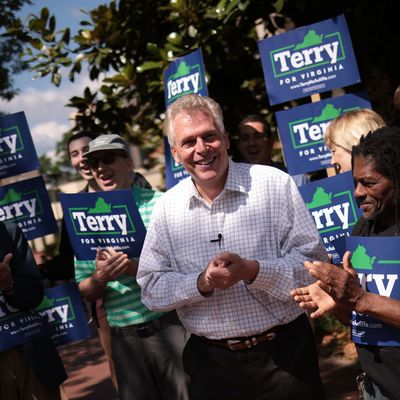
Now that the major-party nominees have been selected in the Virginia governor’s race, there are two competing narratives you will hear about the most competitive statewide election of 2021. One is that Virginia has become a reliably blue state in recent years, making any serious Democratic candidate a solid favorite. And the other is that in all but one Virginia gubernatorial election dating back to 1977, the candidate whose party controlled the White House lost. That’s ten out of 11.
The one exception to the latter “rule” may have confirmed the former: In 2013, Democrat Terry McAuliffe won the governorship despite Barack Obama’s serving as president. And as it happens, McAuliffe is attempting a comeback this year (Virginia has a ban on consecutive terms) and won his party’s primary easily earlier this month over several credible opponents.
But the logic of a second McAuliffe win isn’t keeping Democrats from some paranoia about this race. And two early general-election polls (both from relatively little-known pollsters who have demonstrated a mild Republican bias in earlier surveys) show a close race. WPA Intelligence had McAuliffe leading Republican nominee Glenn Youngkin by a slim 48-46 margin among likely voters in a poll conducted in early June. Then, a week later JMC Analytics showed T-Mac up 46-42 among likely voters.
In his curse-breaking 2013 win, McAuliffe defeated Ken Cuccinelli by a narrow 2.6 percent. The competitiveness of the race came as a bit of a surprise because Cuccinelli was (and is) considered to be something of an extremist by Virginia standards. The policy positions Youngkin took in winning the 2021 nomination in a significantly more conservative (or at least Trumpy) Virginia GOP were probably well to the right of Cuccinelli’s. But his message (which he is usefully backing with an enormous personal fortune) is the time-tested businessman-outsider pitch, which could be effective because, for better or worse, Terry McAuliffe is the consummate insider.
Still, Virginia is bluer than it was a decade ago. The Democratic margin of victory in presidential races has risen from 3.9 percent in 2012 to 5.3 percent in 2016 to 10.1 percent in 2020. Democrat Ralph Northam won the last governor’s race in 2017 by 8.9 percent. Senators Mark Warner and Tim Kaine were last reelected by landslides (in 2020 and 2018, respectively).
Given the current climate of partisan polarization and the sometimes-depressed turnout characteristic of off-year elections, you can expect both candidates to focus on energizing their bases. For McAuliffe (who has some credibility issues with progressives), that will mean a lot of talk about Donald Trump. The 45th president is notoriously unpopular in the vote-rich Northern Virginia suburbs of Washington, D.C. In addition, Youngkin has worked to establish some MAGA street cred, only accepting the full legitimacy of Joe Biden’s election after nailing down the GOP nomination. Even if he is trying to recast himself as a reasonably moderate conservative, Youngkin will try to convince suburban swing voters that T-Mac’s party is deep-red socialist and hates cops. It will be interesting to see how close Youngkin comes to open race-baiting, since McAuliffe will undoubtedly count on Black voter mobilization, with Asian-American and Latino voters also mattering a great deal.
It’s very clear no campaign talking point on either side will go unheard for more than about five minutes, given the big spending we can expect. Youngkin (the former CEO of a giant private equity firm) has a net worth of $254 million. And McAuliffe is a legendary fundraiser with a good head start. It’s also possible the national parties will get involved, since this is the most competitive statewide race this year (New Jersey’s gubernatorial race and California’s gubernatorial recall could draw attention and dollars, but Democrats are comfortably favored in both at present).
Candidates in off-year elections sometimes try to ride national trends and sometimes try to fight them. Certainly Beltway pundits will try to treat nearby Virginia’s contest as little more than a referendum on Joe Biden and Democrats in Congress. But most Virginians will remember McAuliffe’s prior governorship, which left him reasonably popular when he finished his term.
One big strategic decision for Youngkin is what he will do if Donald Trump offers to campaign for him or just shows up. He will almost certainly fare better if his race is about anything other than Trump, but he’ll have to put the red cap back if circumstances dictate it. But then this is not a problem that is exclusive to Youngkin or to Virginia Republicans. It overhangs every election through 2024.






























